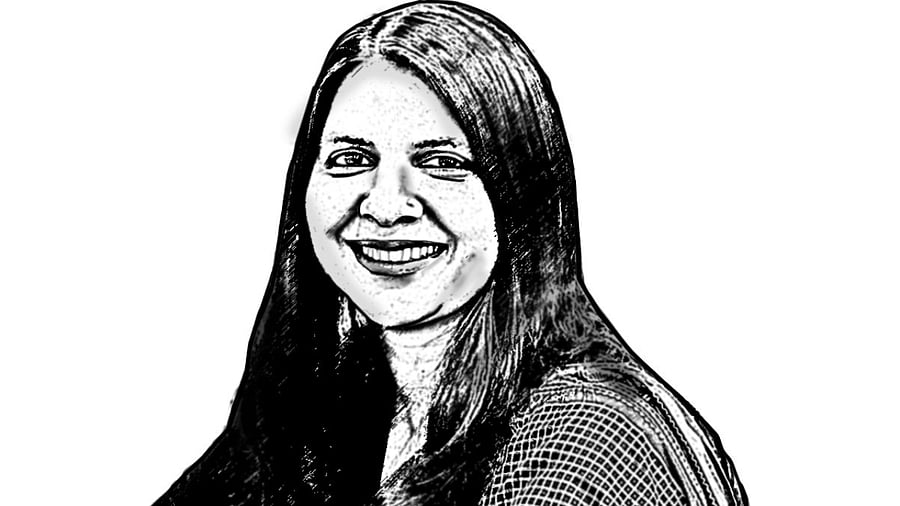
Yamini Aiyar, the think tank head indulges in wonkery, but is really just intrigued by the everyday life of the Sarkar. X/@AiyarYamini
I am a half Sardarni (mother), half Tamilian (father), married to a Malayali, living in New Delhi. For me, at a deeply personal level, there is no “North-South divide”, the latest political canard being imposed on us. There is India, whose diversities of culture, religion, language and, above all, food bind us together, affording a unique richness of experience and that has shaped our collective, shared identity as Indians. My parents have this wonderful story about their wedding. In the early 1970s, theirs was an unusual alliance. Several family members were unhappy and didn’t attend. But those who did became curious. When food was served, there was an unexpected sea of pagdis at the “madarasi” counter (this was before idli-dosa stalls became a common sight) and, on the other side, a few brave TamBrams, were caught straying over to the tandoori chicken, mischievously biting into the ‘forbidden fruit’. Decades later, I introduced the Sardars to Malayali culture. The gregarious Sardars, who had stereotyped all those who reside south of the Vindhyas as “madarasi”, were stunned to encounter the Malayali, who outdanced and outdrank them. “These are the Punjabis of the South,” they proudly announced! The Mallus were too busy downing whisky to object.
These are the everyday experiences that shape our national identity. For all our differences of food, culture and language, there is a shared curiosity and richness that has enabled us to bridge divides. Paneer terrorises us at every family function from Amritsar to Trivandrum. And the ubiquitous idli-sambar can be found in the remotest corners of rural Bihar. This shared diversity is what our founding fathers aspired for, over petty divisions, for India, that is Bharat, the Union of States. And this is why federalism, as the accommodative principle, to respond to linguistic, regional, and ethnic anxieties, by opening sites for broad-based democratic representation, is crucial for India. Political diversity and differences of preferences between North-South, East-West ought to be celebrated -- as much as a hegemonic, “one nation”, “one identity”, “one language” politics should be strongly resisted. But the truth is, the federal framework is today under deep stress, and politics risks strengthening divisions rather than accommodating them.
There are, of course, deep differences between the North and South, visible in economic and social realities. Ironically, these differences and associated inequalities have broken traditional linguistic and cultural barriers and brought the North and South far closer together. Workers from UP and Bihar increasingly make their way to Tamil Nadu and Kerala. India is on the move and this, as former civil servant K P Krishnan delightfully recounted in a recent podcast with Amit Verma, means that you are more likely to be served your dosa in Chennai’s most famous restaurant if you ask for it in Hindi than Tamil.
But mobility needs to be negotiated with sensitivity and political maturity. It can easily fall prey to nativist sentiment and anxieties about the cultural and economic consequences of too many “outsiders”. This has tempted our politics, visible in the increased popularity of legislation for locals-only job reservations and the routine amplification of anti-migrant rhetoric. In a recent paper for a project on federalism hosted by the Centre for Policy Research, scholar Chinmay Tumbe notes the increase in political conflict linked to migration across the country and the increasing anti-migrant worker laws and policies. Ironically, the latter increased after the Covid-19 lockdown.
This increased nativist sentiment exists alongside a growing tension in the fiscal space. As observers of India’s fiscal federalism have repeatedly pointed out, including in this column, the growing social-economic inequities risk breaking what economist Rathin Roy calls the “fraternal principle” – the principle of richer states subsidising poorer states via tax-sharing – that has long guided inter-governmental fiscal relations.
This is visible in debates around the 15th and 16th Finance Commissions and the popularity of the political argument that the better performing southern states ought not to be penalised via progressive fiscal redistribution. Add to this the fact that the Union government has routinely undermined fiscal federalism through the unsavory practice of increasing cess and surcharge (not shareable with states) to ringfence tax revenues for its own purposes. In fact, in recent years, the Union has routinely used every tool available, from centrally-sponsored schemes to cess to even, on occasion, GST, to centralise fiscal resources. Consequently, competition for limited fiscal resources is heightened, setting the political stage for deepening nativist and North-South divisive political rhetoric.
What makes the federal compact even more fragile is the impending delimitation exercise. As my colleague Neelanjan Sircar has argued in these pages, the northern states (UP, Bihar, MP, Rajasthan) are likely to see a 63% increase in seats while the southern states of Tamil Nadu, Andhra Pradesh and Kerala will see a mere 6% increase. Inevitably, this raises concerns about democratic representation. Set this against the backdrop of the increased political and fiscal centralisation that India has witnessed in recent years, the attempt to impose a cultural uniformity by the BJP, the routine flirtation with imposing Hindi, and the possibilities of a divisive sub-national politics are far more real today, in a more mobile and integrated India than ever before. This should worry us deeply.
Responding to the socio-economic realities of India today requires a politics of accommodation, of deliberation and dialogue. Not the divisive rhetoric that is being stoked today. More dangerously, a national politics that seeks to impose a hegemonic, cultural uniformity on a diverse polity, rather than leaning on the federal principle to negotiate complex realities, will unstick the very glue that binds us together. India cannot afford a North-South divide. It needs a politics of North-South accommodation, partnership, and a celebration of diversity. The consequences of not doing so are too dangerous to contemplate.